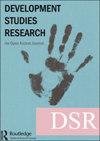冲突后环境下的社会创新:影响社会服务非政府组织的外部因素
Q2 Social Sciences
引用次数: 1
摘要
虽然外部环境因素对非政府组织(ngo)影响的研究在国际发展文献中得到了很好的探讨,但这些因素对非政府组织在冲突后发展环境中的变革作用的重要性仍然知之甚少。然而,在这种情况下,外部环境因素可能对非政府组织产生至关重要的影响,特别是当非政府组织希望将社会创新方法纳入其提供的社会服务中时。本研究利用波斯尼亚和黑塞哥维那冲突后社会服务非政府组织工作人员的调查数据(N = 120),并运用资源依赖理论,确定了非政府组织在整合社会创新方法时非常重要的三个环境因素:有保障的融资、服务使用者参与创新服务的意愿和实施服务的可持续性。相比之下,政策和监管框架以及公共机构的开放性的重要性不高。执照和认证、服务质量标准和税收减免的重要性就更小了。研究结果有助于从冲突后环境的角度理解外部因素对非政府组织社会创新发展的重要性。本文章由计算机程序翻译,如有差异,请以英文原文为准。
Social innovation in a post-conflict setting: examining external factors affecting social service NGOs
ABSTRACT While the study of the influence of external environmental factors on non-governmental organizations (NGOs) is well explored in the international development literature, the importance of these factors on NGOs’ transformative roles in a post-conflict development setting remains less understood. Nevertheless, external environmental factors could have a crucial impact on NGOs in such a context, especially when NGOs want to integrate a socially innovative approach into the social services they provide. Using survey data of staff members of social service NGOs from post-conflict Bosnia and Herzegovina (N = 120) and applying resource dependence theory, this study identifies three environmental factors of great importance for NGOs when integrating a socially innovative approach: secured financing, the willingness of service users to participate in innovative services, and the sustainability of the implemented services. By contrast, policy and regulatory frameworks and public institutions’ openness are of moderate importance. Licensing and accreditation, service quality standards, and tax breaks are of even less importance. The results contribute to the understanding of the importance of external factors in the development of social innovations by the NGO sector from the perspective of the post-conflict context.
求助全文
通过发布文献求助,成功后即可免费获取论文全文。
去求助
来源期刊

Development Studies Research
Social Sciences-Development
CiteScore
3.20
自引率
0.00%
发文量
20
审稿时长
12 weeks
期刊介绍:
Development Studies Research ( DSR) is a Routledge journal dedicated to furthering debates in development studies. The journal provides a valuable platform for academics and practitioners to present their research on development issues to as broad an audience as possible. All DSR papers are published Open Access. This ensures that anyone, anywhere can engage with the valuable work being carried out by the myriad of academics and practitioners engaged in development research. The readership of DSR demonstrates that our goal of reaching as broad an audience as possible is being achieved. Papers are accessed by over 140 countries, some reaching over 9,000 downloads. The importance of the journal to impact is thus critical and the significance of OA to development researchers, exponential. Since its 2014 launch, the journal has examined numerous development issues from across the globe, including indigenous struggles, aid effectiveness, small-scale farming for poverty reduction, sustainable entrepreneurship, agricultural development, climate risk and the ‘resource curse’. Every paper published in DSR is an emblem of scientific rigour, having been reviewed first by members of an esteemed Editorial Board, and then by expert academics in a rigorous review process. Every paper, from the one examining a post-Millennium Development Goals environment by one of its architects (see Vandermortele 2014), to ones using established academic theory to understand development-imposed change (see Heeks and Stanforth 2015), and the more policy-oriented papers that contribute valuable recommendations to policy-makers and practitioners (see DSR Editor’s Choice: Policy), reaches a multidisciplinary audience.
 求助内容:
求助内容: 应助结果提醒方式:
应助结果提醒方式:


